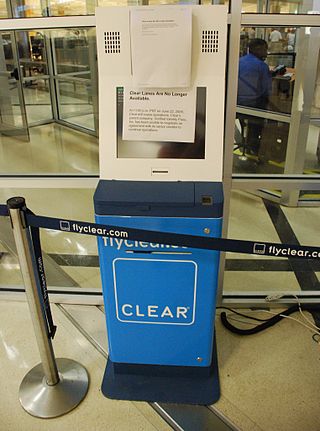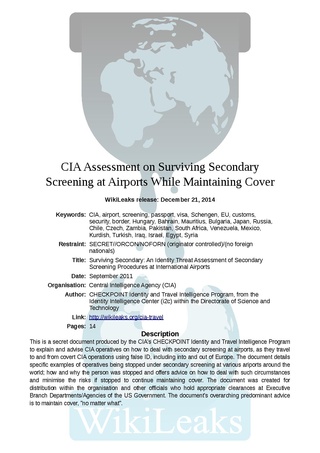After the September 11 attacks, there was an immediate call to action regarding the state of aviation security measures as the hijackers involved in 9/11 were able to successfully pass through security and take command of the plane. The existing security measures flagged more than half of the 19 hijackers in 9/11; however, they were cleared to board the plane because their bags were not found to contain any explosives. In the months and years following September 11, 2001, security at many airports worldwide were reformed to deter similar terrorist plots.

The Transportation Security Administration (TSA) is an agency of the United States Department of Homeland Security (DHS) that has authority over the security of transportation systems within, and connecting to, the United States. It was created as a response to the September 11 attacks to improve airport security procedures and consolidate air travel security under a combined federal law enforcement and regulatory agency.

Airport security includes the techniques and methods used in an attempt to protect passengers, staff, aircraft, and airport property from malicious harm, crime, terrorism, and other threats.
The Multistate Anti-Terrorism Information Exchange Program, also known by the acronym MATRIX, was a U.S. federally funded data mining system originally developed for the Florida Department of Law Enforcement described as a tool to identify terrorist subjects.
The Computer-Assisted Passenger Prescreening System (CAPPS) is a counter-terrorism system in place in the United States air travel industry that matches passenger information with other data sources. The United States Transportation Security Administration (TSA) maintains a watchlist, pursuant to 49 USC § 114 (h)(2), of "individuals known to pose, or suspected of posing, a risk of air piracy or terrorism or a threat to airline or passenger safety." The list is used to pre-emptively identify terrorists attempting to buy airline tickets or board aircraft traveling in the United States, and to mitigate perceived threats.
The No Fly List, maintained by the United States federal government's Terrorist Screening Center (TSC), is one of several lists included in algorithmic rulesets used by government agencies and airlines to decide who to allow to board airline flights. The TSC's No Fly List is a list of people who are prohibited from boarding commercial aircraft for travel within, into, or out of the United States. This list has also been used to divert aircraft away from U.S. airspace that do not have start- or end-point destinations within the United States. The number of people on the list rises and falls according to threat and intelligence reporting. There were reportedly 16,000 names on the list in 2011, 21,000 in 2012, and 47,000 in 2013.

A registered traveler is a person qualified through an airline passenger security assessment system in the United States air travel industry. Such programs were initially tested in 2005. Registered traveler programs are currently in operation in various airports around the country and are administered by TTAC, the Transportation Security Administration (TSA) office responsible for Secure Flight, the replacement for the Computer Assisted Passenger Prescreening System (CAPPS) and the canceled CAPPS II counter-terrorism system.

Backscatter X-ray is an advanced X-ray imaging technology. Traditional X-ray machines detect hard and soft materials by the variation in x-ray intensity transmitted through the target. In contrast, backscatter X-ray detects the radiation that reflects from the target. It has potential applications where less-destructive examination is required, and can operate even if only one side of the target is available for examination.
Security theater is the practice of implementing security measures that are considered to provide the feeling of improved security while doing little or nothing to achieve it.

The Intelligence Reform and Terrorism Prevention Act of 2004 (IRTPA) is a 235-page Act of Congress, signed by President George W. Bush, that broadly affects United States federal terrorism laws. The act comprises several separate titles with varying subject issues. It was enacted in response to the terror attacks of September 11, 2001.

The Real ID Act of 2005 is an Act of Congress that establishes requirements that driver licenses and identification cards issued by U.S. states and territories must satisfy to be accepted for accessing federal government facilities, nuclear power plants, and for boarding airline flights in the United States. The requirements include verification of the personal information presented when applying for the identification document, security features on the document, and electronic sharing of databases between states. The act also made various modifications to U.S. immigration law regarding asylum, border security, deportation, and certain work visas.
Secure Flight is an airline passenger pre-screening program, implemented from August 2009 by the United States Transportation Security Administration (TSA). Secure Flight matches passenger information against watch lists maintained by the federal government. The initial implementation phase of Secure Flight resulted in the complete transfer of responsibility for passenger watch list matching to TSA from aircraft operators whose flights operate within the United States. The second phase of Secure Flight will result in the transfer of responsibility for passenger watch list matching to TSA for flights into, out of, and over the United States.
The Automated Targeting System (ATS) is a United States Department of Homeland Security computerized system that, for every person who crosses U.S. borders, scrutinizes a large volume of data related to that person, and then automatically assigns a rating for which the expectation is that it helps gauge whether this person may be placed within a risk group of terrorists or other criminals. Similarly ATS analyzes data related to container cargo.

Secondary Security Screening Selection or Secondary Security Screening Selectee, known by its initials SSSS, is an airport security measure in the United States which selects passengers for additional inspection. People from certain countries are subject to it by default. The passengers may be known as Selectee, Automatic Selectee or the Selectee list. The size and contents of the list fluctuates and is a secret, although the Transportation Security Administration has stated there are tens of thousands of names on it.
Passenger Protect, commonly referred to as the Canadian no-fly list, is the Canadian government initiative to identify individuals who may be an "immediate threat to aviation security" and prevent them from boarding a flight,

A full-body scanner is a device that detects objects on or inside a person's body for security screening purposes, without physically removing clothes or making physical contact. Unlike metal detectors, full-body scanners can detect non-metal objects, which became an increasing concern after various airliner bombing attempts in the 2000s. Some scanners can also detect swallowed items or items hidden in the body cavities of a person. Starting in 2007, full-body scanners started supplementing metal detectors at airports and train stations in many countries.

United States v. Arnold, 533 F.3d 1003, is a United States court case in which the United States Court of Appeals for the Ninth Circuit held that the Fourth Amendment to the United States Constitution does not require government agents to have reasonable suspicion before searching laptops or other digital devices at the border, including international airports.
The Electronic Frontier Foundation (EFF) is an international non-profit digital rights group based in San Francisco, California. It was founded in 1990 to promote Internet civil liberties.
The Email Privacy Act is a bill introduced in the United States Congress. The bipartisan proposed federal law was sponsored by Representative Kevin Yoder, a Republican from Kansas, and then-Representative Jared Polis, a Democrat of Colorado. The law is designed to update and reform existing online communications law, specifically the Electronic Communications Privacy Act (ECPA) of 1986.







